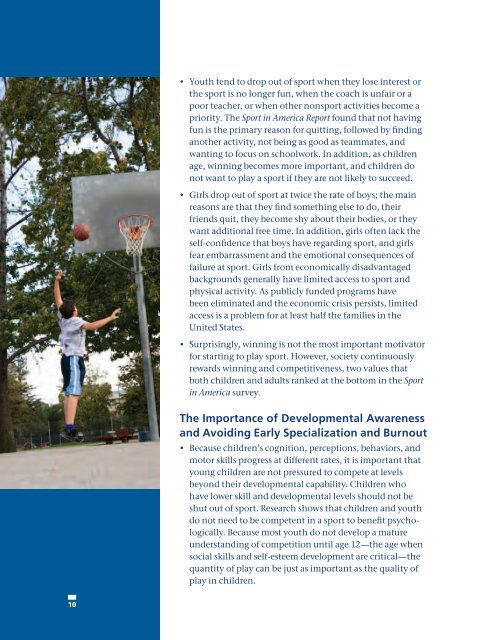True-Sport-Report
You also want an ePaper? Increase the reach of your titles
YUMPU automatically turns print PDFs into web optimized ePapers that Google loves.
• Youth tend to drop out of sport when they lose interest or<br />
the sport is no longer fun, when the coach is unfair or a<br />
poor teacher, or when other nonsport activities become a<br />
priority. The <strong>Sport</strong> in America <strong>Report</strong> found that not having<br />
fun is the primary reason for quitting, followed by finding<br />
another activity, not being as good as teammates, and<br />
wanting to focus on schoolwork. In addition, as children<br />
age, winning becomes more important, and children do<br />
not want to play a sport if they are not likely to succeed.<br />
• Girls drop out of sport at twice the rate of boys; the main<br />
reasons are that they find something else to do, their<br />
friends quit, they become shy about their bodies, or they<br />
want additional free time. In addition, girls often lack the<br />
self-confidence that boys have regarding sport, and girls<br />
fear embarrassment and the emotional consequences of<br />
failure at sport. Girls from economically disadvantaged<br />
backgrounds generally have limited access to sport and<br />
physical activity. As publicly funded programs have<br />
been eliminated and the economic crisis persists, limited<br />
access is a problem for at least half the families in the<br />
United States.<br />
• Surprisingly, winning is not the most important motivator<br />
for starting to play sport. However, society continuously<br />
rewards winning and competitiveness, two values that<br />
both children and adults ranked at the bottom in the <strong>Sport</strong><br />
in America survey.<br />
The Importance of Developmental Awareness<br />
and Avoiding Early Specialization and Burnout<br />
• Because children’s cognition, perceptions, behaviors, and<br />
motor skills progress at different rates, it is important that<br />
young children are not pressured to compete at levels<br />
beyond their developmental capability. Children who<br />
have lower skill and developmental levels should not be<br />
shut out of sport. Research shows that children and youth<br />
do not need to be competent in a sport to benefit psychologically.<br />
Because most youth do not develop a mature<br />
understanding of competition until age 12—the age when<br />
social skills and self-esteem development are critical—the<br />
quantity of play can be just as important as the quality of<br />
play in children.<br />
10


